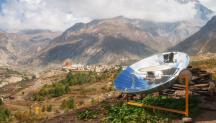

Renewable Energy: Saving Lives One Joule At a Time
Newsletter
Climate change is a difficult subject to relate to. We get lost in the science, citing figures on atmospheric carbon dioxide, global temperature trends, and tipping points for climate disaster. Or we get lost in the scale, discussing the enormity of its impact on the environment, global ecosystems, and transcontinental weather patterns. In all this grandiosity, we lose sight of the most fundamental effect of climate change: decreased human health. Today at the UN Climate Change Conference, the World Health Organization highlighted some staggering figures about the effects of climate change on human health:
- Climate change is already dramatically affecting human health
- Instances of diarrhea increase 8% for every 1 degree centigrade temperature rise
- Air pollution has caused more than 7 million deaths (the AIDS pandemic killed 2.3 million people in its worst year)
- Asthma now affects over 40% of Delhi residents, with air quality amongst the worst in the world
- Climate change causes death and injury through heat, vector borne diseases, extreme weather events, food and water borne illnesses, and malnutrition
The health impact of emissions from global energy use is significant, but its economic cost is difficult to quantify. A 2013 study conducted by experts from the US Environmental Protection Agency found that the national economic health cost caused by fossil fuels was between USD 361.7 billion and USD 886.5 billion annually. The European Health and Environment Alliance found that emissions from Europe’s coal-fired power plants cost its citizens up to EUR 42.8 billion in health costs every year.
IRENA research estimates that doubling the global share of renewable energy – a goal well within reach by 2030 – could improve health enough to reduce global health costs by up to USD 200 billion. This makes renewable energy so much more than just a way to reduce global emissions. The global implementation of renewables ensures nothing less than the health of humanity.
Now that's something we can all relate to.




